com-, co-, cog-, col-, con-, cor-
(Latin: together, together with, with)
The prefix com- is assimilated to co- before h, w, and all vowels:
The prefix com- becomes, cog- before g: cognition, [co + gnoscere, "to know"], et al.
The prefix com- becomes, col- before l: colloquial, et al.
The prefix com- becomes, con- before c, d, g, j, n, q, s, t, v: covivant, et al.
The prefix com- becomes, cor- before r: corrigible, et al.
The words for this unit show cartoons for all of the examples of the com-, co-, cog-, col-, con-, cor- entries; however, there are many more of them which exist in other units which are available when you type in a particular word in the search box at the bottom of this page.
concise (adjective), more concise, most concise
1. A reference to the use of as few words as possible to provide necessary information, or which is compressed in order to be brief: When correcting the term papers for his students, Mr. Mount was very concise in his remarks, making sure they were short and to the point.
2. Pertaining to the expression of a great deal of information in a few words or using clear and succinct statements: The biography of the famous author was written in a concise and short summary.
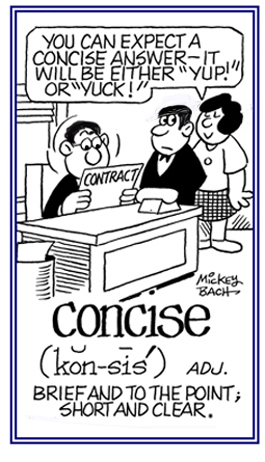
© ALL rights are reserved.
Go to this Word A Day Revisited Index
2. Pertaining to the expression of a great deal of information in a few words or using clear and succinct statements: The biography of the famous author was written in a concise and short summary.

Go to this Word A Day Revisited Index
so you can see more of Mickey Bach's cartoons.
1. A secret or confidential meeting: A conclave is a meeting of a group of people who discuss something privately.
2. In the Roman Catholic Church, a set of private rooms in which the cardinals meet to elect a new pope: The exclusive and closed conclave in the building is to be used by the bishops to decide who the next new head of the Catholic Church will be.
3. A meeting of family members or associates: The secretaries at the firm were in a conclave to plan a surprise birthday party for their boss, Mr. Chief, who had always been very nice and respectful towards them.
4. Etymology: "a place where cardinals meet to elect a pope"; from Italian conclave, from Latin conclave, "a room, a chamber suite"; "a room which may be locked"; from com-, "together" + clavis, "a key".
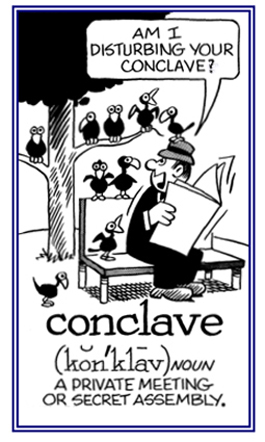
© ALL rights are reserved.
Go to this Word A Day Revisited Index
2. In the Roman Catholic Church, a set of private rooms in which the cardinals meet to elect a new pope: The exclusive and closed conclave in the building is to be used by the bishops to decide who the next new head of the Catholic Church will be.
3. A meeting of family members or associates: The secretaries at the firm were in a conclave to plan a surprise birthday party for their boss, Mr. Chief, who had always been very nice and respectful towards them.
4. Etymology: "a place where cardinals meet to elect a pope"; from Italian conclave, from Latin conclave, "a room, a chamber suite"; "a room which may be locked"; from com-, "together" + clavis, "a key".
Conclave originates from the Latin expression cum clave, "with a key"; which emphasizes a seclusion and the need for a key to enter a meeting.

Go to this Word A Day Revisited Index
so you can see more of Mickey Bach's cartoons.
conclusive (adjective), more conclusive, most conclusive
A reference to evidence or an argument that is decisive or convincing: There was conclusive confirmation on the telephone bill which showed that the Johnson’s daughter, Sharon, had made an excessive number of phone calls!
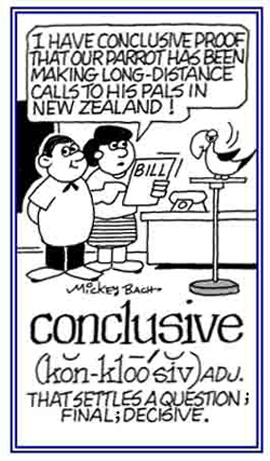
© ALL rights are reserved.
Go to this Word A Day Revisited Index

Go to this Word A Day Revisited Index
so you can see more of Mickey Bach's cartoons.
concoct (verb), concocts; concocted; concocting
1. To make up or to prepare by mixing a variety of ingredients; especially, of a soup, a drink, etc.: Lisa loves to concoct an evening drink by using some lime juice, dark rum, and non-alcoholic ginger beer with ice cubes!
2. To conceive or to create by using skill and intelligence: Henry wanted to concoct a mystery story by using a lot of his imagination without including ideas from his previous mystery stories.
3. To make up, to think, or to fabricate a story or reason for doing something: Tom's children decided to concoct a scheme so they could stay up late on Saturday night to see a special TV movie!
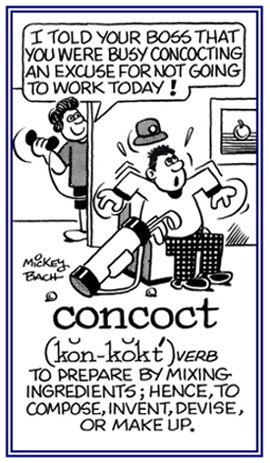
© ALL rights are reserved.
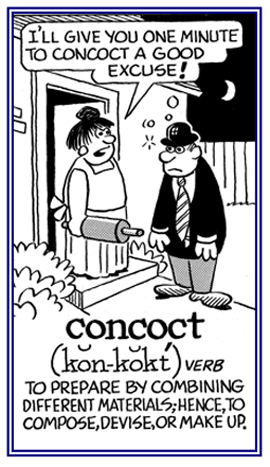
© ALL rights are reserved.
Go to this Word A Day Revisited Index
2. To conceive or to create by using skill and intelligence: Henry wanted to concoct a mystery story by using a lot of his imagination without including ideas from his previous mystery stories.
3. To make up, to think, or to fabricate a story or reason for doing something: Tom's children decided to concoct a scheme so they could stay up late on Saturday night to see a special TV movie!


Go to this Word A Day Revisited Index
so you can see more of Mickey Bach's cartoons.
1. An expression or declaration of sympathy with someone who has experienced pain, grief, or misfortune: Mary offered her condolences to her neighbors who had just lost their son in a car accident.
2. Etymology: from Late Latin condolere, "to suffer together" from com- "with" + dolere, "to grieve".
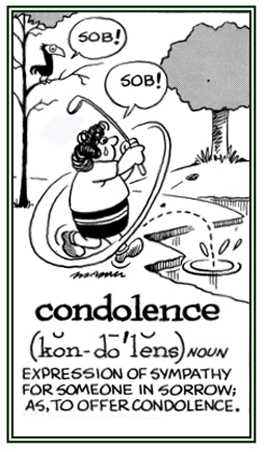
© ALL rights are reserved.
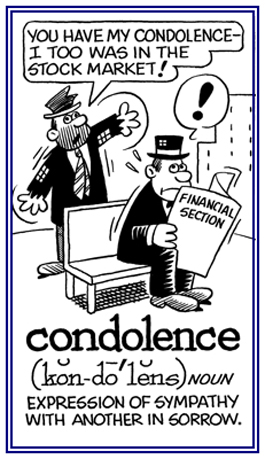
© ALL rights are reserved.
Go to this Word A Day Revisited Index
2. Etymology: from Late Latin condolere, "to suffer together" from com- "with" + dolere, "to grieve".


Go to this Word A Day Revisited Index
so you can see more of Mickey Bach's cartoons.
1. In architecture, an individually owned unit of real estate, especially an apartment or townhouse, in a building or on land that is owned in common by the owners of the units: Jim told his friend that he intended to buy a condominium before he retired because he was tired of renting an apartment.
2. A building or complex containing apartments or townhouses: The condominium on the corner has a great view of the ravine and river that is just across the street.
3. In politics, a country governed by two or more different countries with joint responsibilities: The countries on both sides of the river agreed to a condominium so that neither one would have sole ownership of the river and the commerce that used it.
4. Etymology: from Modern Latin, "joint sovereignty", apparently coined in German about 1700 from com-, "together" + dominum, "right of ownership".
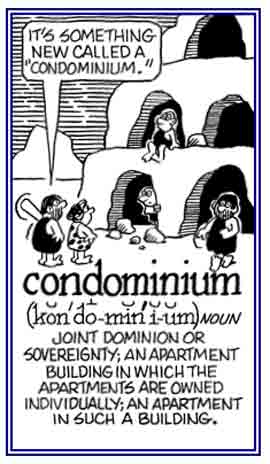
© ALL rights are reserved.
Go to this Word A Day Revisited Index
2. A building or complex containing apartments or townhouses: The condominium on the corner has a great view of the ravine and river that is just across the street.
3. In politics, a country governed by two or more different countries with joint responsibilities: The countries on both sides of the river agreed to a condominium so that neither one would have sole ownership of the river and the commerce that used it.
4. Etymology: from Modern Latin, "joint sovereignty", apparently coined in German about 1700 from com-, "together" + dominum, "right of ownership".
The sense of "privately owned apartment" came into existence in American English, about 1962, as a special use of the legal term.

Go to this Word A Day Revisited Index
so you can see more of Mickey Bach's cartoons.
confabulate (kuhn FAB yuh layt") (verb), confabulates; confabulated; confabulating
1. To discuss or to have a chat about something: Linda loved to confabulate with her friends about their children while having afternoon tea once a week.
2. To give fictitious accounts of past events, believing they are true, in order to cover a gap in the memory caused by a medical condition; such as, dementia: Usually, when Sam visited his Aunt Jane in the home for elderly people, she loved to confabulate about her earlier life as a child, but Sam knew the stories didn’t really happen.
3. To unconsciously replace fact with fantasy in one's memory: Jackie didn’t remember much when she was a toddler, but she thought she did, and so she liked to confabulate stories about her life on the farm when she was two-years old.
4. To have a conference in order to talk something over: The administrators of the school departments confabulated on how much financial support each one should get and use for the year.
5. To talk socially without exchanging too much information: The two old friends sat on a park bench and began to confabulate about the weather conditions and other irrelevant things, but they mentioned very little about their personal lives.
6. Etymology: from Latin com, "together" + fabulari, "to talk".
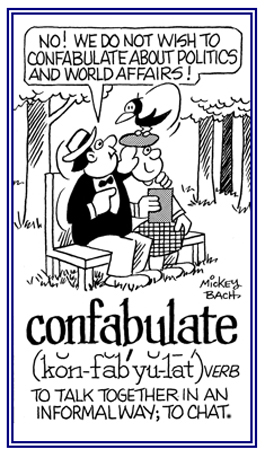
© ALL rights are reserved.
Go to this Word A Day Revisited Index
2. To give fictitious accounts of past events, believing they are true, in order to cover a gap in the memory caused by a medical condition; such as, dementia: Usually, when Sam visited his Aunt Jane in the home for elderly people, she loved to confabulate about her earlier life as a child, but Sam knew the stories didn’t really happen.
3. To unconsciously replace fact with fantasy in one's memory: Jackie didn’t remember much when she was a toddler, but she thought she did, and so she liked to confabulate stories about her life on the farm when she was two-years old.
4. To have a conference in order to talk something over: The administrators of the school departments confabulated on how much financial support each one should get and use for the year.
5. To talk socially without exchanging too much information: The two old friends sat on a park bench and began to confabulate about the weather conditions and other irrelevant things, but they mentioned very little about their personal lives.
6. Etymology: from Latin com, "together" + fabulari, "to talk".

Go to this Word A Day Revisited Index
so you can see more of Mickey Bach's cartoons.
1. Someone who works with another person to achieve something which is sometimes secret or illegal: Greg and his sister both wanted to study chemistry, so they considered themselves confederates because both of them were studying and helping each other to achieve their goals.
2. A group of people, states, or political parties that have united for a particular purpose; especially, a political one: The two countries agreed to join their forces as confederates and to fight against terrorist groups.
3. Etymology: from Latin confoederare, "to unite"; from com-, "with, together" + foederare, "to establish by treaty or league (a collection of people, countries, or groups that combine for a particular purpose)".

© ALL rights are reserved.
Go to this Word A Day Revisited Index
2. A group of people, states, or political parties that have united for a particular purpose; especially, a political one: The two countries agreed to join their forces as confederates and to fight against terrorist groups.
3. Etymology: from Latin confoederare, "to unite"; from com-, "with, together" + foederare, "to establish by treaty or league (a collection of people, countries, or groups that combine for a particular purpose)".

Go to this Word A Day Revisited Index
so you can see more of Mickey Bach's cartoons.
conform (verb), conforms; conformed; conforming
1. To comply with rules, standards, or laws: The changes were introduced by the governor to conform with the ordinances of the state.
2. To behave according to socially acceptable conventions or standards: When going to a foreign country like Morocco, it is a good idea to conform to the local custom of clothing and to wear something modest.
3. To be similar in form or type; to agree: The steps leading from the first floor to the third floor had to conform in height, so as not to cause accidents for the people living there.
4. Etymology: from Latin conformare, "to fashion, to form, to shape; to educate; to modify";
from com-, "together" + formare, "to form".

© ALL rights are reserved.
Go to this Word A Day Revisited Index
2. To behave according to socially acceptable conventions or standards: When going to a foreign country like Morocco, it is a good idea to conform to the local custom of clothing and to wear something modest.
3. To be similar in form or type; to agree: The steps leading from the first floor to the third floor had to conform in height, so as not to cause accidents for the people living there.
4. Etymology: from Latin conformare, "to fashion, to form, to shape; to educate; to modify";
from com-, "together" + formare, "to form".

Go to this Word A Day Revisited Index
so you can see more of Mickey Bach's cartoons.
confound (verb), confounds; confounded; confounding
1. To perplex or to amaze; especially, by a sudden disturbance or surprise; to bewilder; to confuse: Trying to comprehend the complicated directions for operating his new TV confounded the father too much.
2. To throw into confusion or disorder: The new tax system confounded the people, because it seemed to be much more complicated than in the previous years.
3. To throw into increased confusion or disorder: The Smith family was planning on going on a camping trip for the very first time and they had a list of what they needed and put everything into orderly piles in the living room. Their little daughter confounded everything by hurling some of their camping gear into the air!
4. To treat or regard erroneously as identical; to mix or associate by mistake: What Jacob said confounded truth with errors.
5. To mingle so that the elements cannot be distinguished or separated: When water and sugar are dissolved together in hot water they are confounded and cannot be parted again.
6. To contradict or to refute: Sharon tried to confound her parent's arguments about her quitting her current job and looking for a new one.
7. Etymology: from Middle English confounden, from Anglo-Norman confundre, from Latin confundere, "to mix together, to confuse"; from com-, "together" + fundere, "to pour".
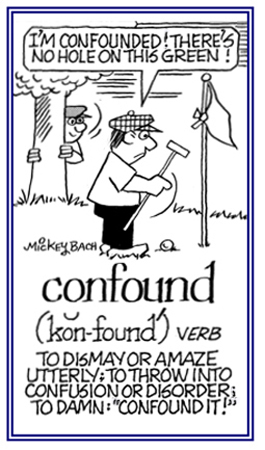
© ALL rights are reserved.
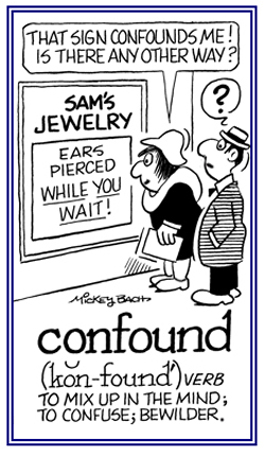
© ALL rights are reserved.
Go to this Word A Day Revisited Index
2. To throw into confusion or disorder: The new tax system confounded the people, because it seemed to be much more complicated than in the previous years.
3. To throw into increased confusion or disorder: The Smith family was planning on going on a camping trip for the very first time and they had a list of what they needed and put everything into orderly piles in the living room. Their little daughter confounded everything by hurling some of their camping gear into the air!
4. To treat or regard erroneously as identical; to mix or associate by mistake: What Jacob said confounded truth with errors.
5. To mingle so that the elements cannot be distinguished or separated: When water and sugar are dissolved together in hot water they are confounded and cannot be parted again.
6. To contradict or to refute: Sharon tried to confound her parent's arguments about her quitting her current job and looking for a new one.
7. Etymology: from Middle English confounden, from Anglo-Norman confundre, from Latin confundere, "to mix together, to confuse"; from com-, "together" + fundere, "to pour".


Go to this Word A Day Revisited Index
so you can see more of Mickey Bach's cartoons.
confounding (adjective), more confounding, most confounding
Relating to being complicated, chaotic, lacking order, or difficult to comprehend: There are confounding explanations for many words found in some dictionaries.
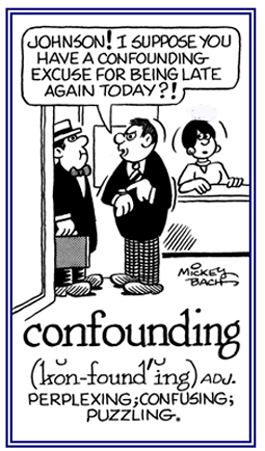
© ALL rights are reserved.
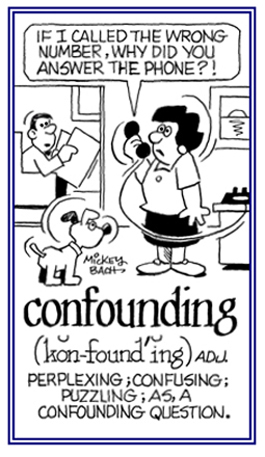
© ALL rights are reserved.
Go to this Word A Day Revisited Index


Go to this Word A Day Revisited Index
so you can see more of Mickey Bach's cartoons.
A fellow member of a profession; a colleague: A confrere of the group of retired teachers sent e-mails to inform them of the next luncheon so they can socialize and confabulate, or chat, with each other.
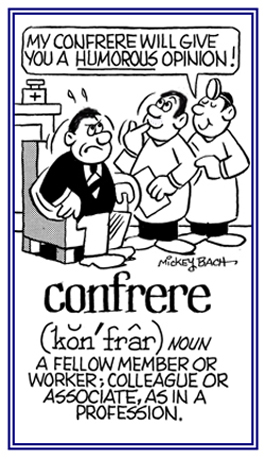
© ALL rights are reserved.
Go to this Word A Day Revisited Index

Go to this Word A Day Revisited Index
so you can see more of Mickey Bach's cartoons.
confront (verb), confronts; confronted; confronting
1. To meet someone face to face with hostile or argumentative intentions: Jacob confronted his brother and accused him of hiding his French book which he needed for school the following day.
2. Etymology: from French confronter; from Latin confrontare; from Latin con-, "with" + frons, front-, "face".

© ALL rights are reserved.
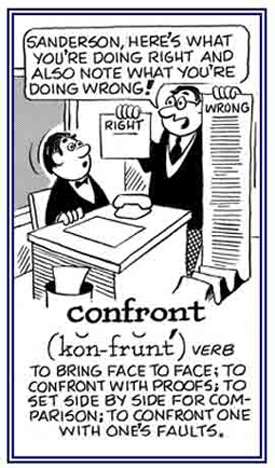
© ALL rights are reserved.
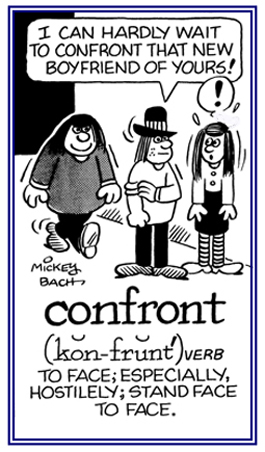
© ALL rights are reserved.
Go to this Word A Day Revisited Index
2. Etymology: from French confronter; from Latin confrontare; from Latin con-, "with" + frons, front-, "face".



Go to this Word A Day Revisited Index
so you can see more of Mickey Bach's cartoons.
congenital (adjective), more congenital, most congenital
1. Regarding something that is present at birth but not necessarily hereditary; pertaining to a condition acquired during fetal development: Little Sarah developed a congenital health disorder before she was born because her mother drank too much alcohol and smoked too much during pregnancy.
2. Characterized by existing, usually before birth, or by referring to conditions that are present with a baby, regardless of their cause: Tommy was diagnosed as being hard of hearing when he was born and this was commented on by the doctors as being a congenital health problem.

© ALL rights are reserved.
Go to this Word A Day Revisited Index
2. Characterized by existing, usually before birth, or by referring to conditions that are present with a baby, regardless of their cause: Tommy was diagnosed as being hard of hearing when he was born and this was commented on by the doctors as being a congenital health problem.

Go to this Word A Day Revisited Index
so you can see more of Mickey Bach's cartoons.
An opinion or conclusion formed on the basis of incomplete information, speculation, or guessing: The book Mary was reading regarding the old house next door was only conjecture, and it didn’t pertain to facts of any kind, since there was no reliable knowledge or data about it at all .

© ALL rights are reserved.

© ALL rights are reserved.
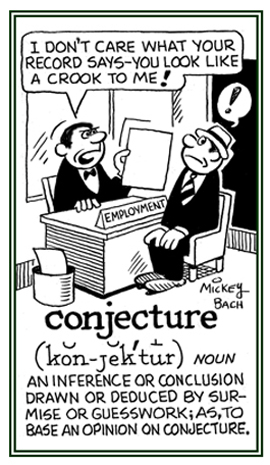
© ALL rights are reserved.
Go to this Word A Day Revisited Index





